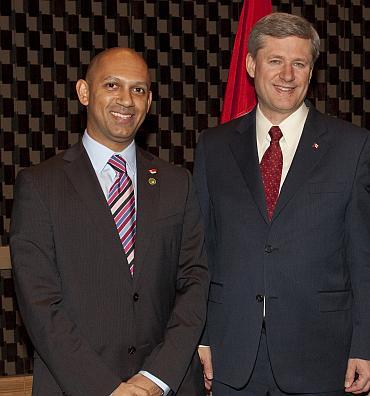 Nadir Patel is among The Globe and Mail's list of 45 Canadians changing the world. 'Largely unknown and--until now--unheralded,' Patel, Canada's Consul General in Shanghai, is amongst this 'burgeoning diaspora: 2.7 million men and women increasingly referred to as Canada's 11th province,' said the daily.
Nadir Patel is among The Globe and Mail's list of 45 Canadians changing the world. 'Largely unknown and--until now--unheralded,' Patel, Canada's Consul General in Shanghai, is amongst this 'burgeoning diaspora: 2.7 million men and women increasingly referred to as Canada's 11th province,' said the daily.
Patel, 40, has featured in the 'Connectors,' category--people who 'make links where none existed before.'

"I was pleasantly surprised when Globe and Mail said they would like to profile me and put me in the company of distinguished Canadians they are profiling," Patel, who was Canada's Chief Air negotiator before his China brief, told Rediff.com. "I said it is great to be in that company. It is quite terrific, as the call was quite out of the blue. The list has the Canadian diaspora representing Canadian interests abroad. It is a privilege and honor for me to be in that list."
Patel, who was named to his current post in April 2009, says "I oversee the management of one of Canada's largest consulates abroad with an estimated staff of 100, and nearly 200 Canadian businesses in Shanghai and the surrounding Yangtze river delta region."
The highlights of his tenure include Canada's participation in the Shanghai Expo, and receiving Prime Minister Stephen Harper and other Canadian leaders who visited China. "It has been an incredible experience for me during these 20 months of being in Shanghai," he says.
Canada and China currently do about $60 billion in trade.
"This is more than India, Japan, the United Kingdom, Brazil and Russia combined. We are doing more trade with China in one month than we are doing with India in a year ($5 billion)," he says. "The difference between China and India is how advanced the infrastructure here is as compared to India. The high speed rail is unparalleled. What used to take a four hour drive from Shanghai to reach Nanjing, and two-and-a-half hours by train, now takes only 70 minutes by high speed train. This has brought about 7.5 million people of Nanjing close to Shanghai. From this you can see the advantages to the Canadian and 48,000 other companies that operate out of Shanghai. Take that example and multiply it all over China. The infrastructure has developed so much that it is creating new competitive advantages for Canadian companies doing businesses in China, in the Chinese market."
Asked about India playing up its similarities with Canada--a democratic system and lack of language barrier--to point out that it was easier for Canadian companies to do business in India, Patel said, "China is not well understood in Canada unless one visited China, or a Canadian has studied in China or has had some business dealings with China. Today there are no issues around language. It is getting easier. We at the Canadian consulate help facilitate Canadian businesses that lack understanding of China. There are challenges in China, but once you come here you realize you can navigate, using interpreters and intermediaries."
The diplomat does not gloss over the challenges though. "Every relationship has some sticking points, but when it comes to trade and investments, for the Chinese, business is business," he says. "If there's an opportunity for a Chinese company to do business in Canada, or for a Canadian company to do business here, those sticking points don't get in the way Every relationship has some issues, but from our perspective the relationship is at an all time high."
"Canada is a brand name highly respected here," he added. "Canada's relations with China go back many years. Last year, we celebrated 40 years of formal diplomatic relations between the two countries. We have 1.3 million Canadians of Chinese descent, we as Canadian diplomats are highly regarded."






